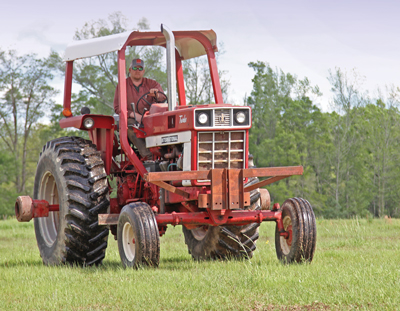Tractors Help Pull In New Audience For Agriculture

In a state where hunting, fishing and football are favorite pastimes, one northwest Alabama county is bucking the trend when it comes to fun while introducing a new generation to farm equipment.
“It started off in the ‘70s when local farmers got together and had a tractor pull,” said Fayette County Federation President Joe Roberts. “Several farmers threw $100 in a hat to see who could pull a sled the farthest. Times got hard, so it kind of faded away in the mid-‘80s, but it’s making a comeback.”
Today, Neal Hindman and Chad Gilreath, whose fathers pulled with Roberts in those early years, are reviving the sport, which attracts farmers and non-farmers alike.
“There’s not a lot of motor sports for agriculture, but this is a motor sport,” Hindman said. “It started with farmers, but now you’ll have people who’ve never farmed, who never intend on farming, and now they’ve got two tractors sitting at home waiting to pull. Plus, it’s just good, clean fun”
Hindman said pulling has become so popular, they started the Fayette County Tractor Pulling Association and host a competition each year. The most rewarding part, he said, is exposing a new audience to agriculture — something he’s loved since childhood.
“We grew up running tractors,” Hindman said. “All I wanted to do was sit on a tractor. Chad and I were always involved with FFA and 4-H, and if you could win the annual Fayette County Tractor Driving Contest, you could write your ticket to national competition.”
Unlike the FFA and 4-H contests, however, the object of tractor pulling is to drag a weighted sled as far as possible.
“It’s not a race,” Gilreath said. “You’re not competing against someone next to you. You’ve got a weighted sled with a big skid panel on the ground. You hook a tractor to the front of it with a chain and drag it. The farther you pull it, the weight transfer comes up and puts more load on your tractor, and it gets harder to pull because you’re putting more weight on the ground.”
Roberts, who chairs the Federation’s State Poultry Committee, said competing in a tractor pull is much different than operating machinery on the farm.
“You have to get the tractor balanced,” Roberts said. “You can go to a track out of town, put the weights in the same place you usually put them, and it will stand straight up. You can come back here and put weights in the same place, and it will be just perfect. There are a lot more variables than what it looks like from in the stands.”
Although tractor pulling is primarily a hobby, the Fayette County farmers say the sport teaches lessons they’ve been able to apply on their farms.
“You learn what a tractor and an engine can stand, if you treat them right,” Roberts said. “We’ve learned a lot that’s benefitted us far beyond tractor pulling.”
Roberts said he’s happy to see the younger generation take the wheel because it gives the Federation another venue to talk to people about the importance of agriculture. In reminiscing about the early days of Fayette County’s tractor pull, Roberts said former county Federation President J.C. Randolph would be proud.
“Mr. Randolph would always say, ‘I don’t hunt and I don’t fish. This is my recreation,’” Roberts recalled. “I think that still applies today.”
